The Marvelous Mrs. Maisel and Lenny Bruce: Nostalgia with Caution
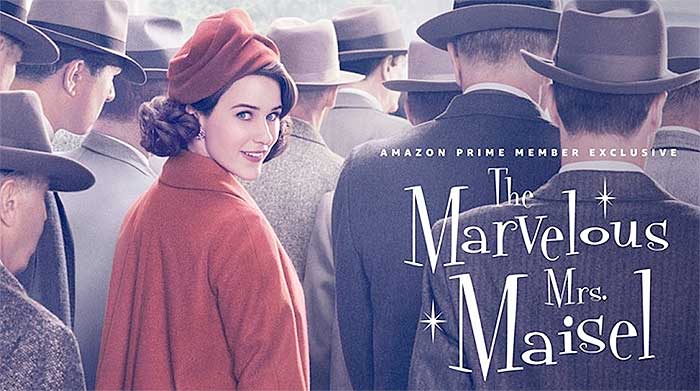
1950s Morality as Nostalgia
In The Marvelous Mrs. Maisel (Prime Original, two seasons so far), Miriam “Midge” Maisel (played by Rachel Brosnahan) is doing her stand-up comedy routine on stage in the last episode of season two and starts talking about a friend being pregnant. The club owner suddenly shuffles her off stage and the exchange goes:
[Club Owner] Are you crazy you can’t say that on stage.
[Mrs. Maisel] Say what “change purse”?
[Club Owner] “Pregnant.” No one wants to hear that word.
[Mrs. Maisel] No one wants to hear “pregnant” on stage?
[Club Owner] It’s foul. This is female stuff.
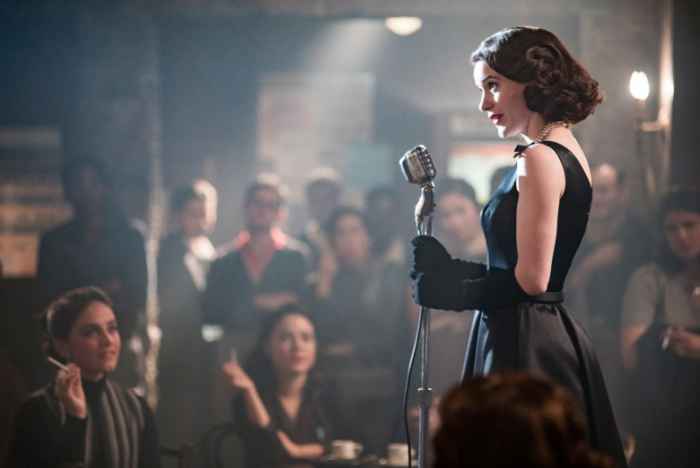
The limits of public decency, of public morality, weave themselves through this excellent series, which is set in the late 1950s. The dialogue (not what is said on stage by Mrs. Maisel, or for that matter any of the stand-up comics) is sharp and witty and reminds one of exchanges between Spencer Tracy and Katharine Hepburn in various movies they made together. It is odd that the actual comedy on stage is basically not funny at all, but the dialogue between and among characters as they go through life is absorbing, entertaining, and filled with wit.
Lenny Bruce, who was a stand-up comedian known for pushing the boundaries of vulgarity (well vulgarity as far as 1950s standards go) is a frequent character in the series. Bruce (played by Luke Kirby) died of a drug overdose in 1966. In the series he talks about warrants out for his arrest regarding different topics he free-form talked about on stage, whether religion, sex, politics. The resurrection of Bruce began before this series started. In 2003, George Pataki, the governor of New York, made a posthumous pardon of Bruce, the first in the history of New York, stating, “Freedom of speech is one of the greatest American liberties, and I hope this pardon serves as a reminder of the precious freedoms we are fighting to preserve as we continue to wage the war on terror.” 1
One of Bruce’s lawyers responded to the pardon by saying, “That’s exactly the kind of appalling hypocrisy that Bruce was against, and I’m sure he would have built up a wonderful routine about it.” 2 In 2017, Rolling Stone ranked Bruce as third behind Richard Pryor and George Carlin on a list of the 50-best stand-up comedians of all time (Robin Williams is 12th, Jonathan Winters 22nd, Woody Allen 30th, Roseanne Barr 38th). Bruce’s ranking seemed less to do with the quality of his humor and more to do with the boundaries he pushed. Rolling Stone stated regarding Bruce, “The revolution started here. He was both the John the Baptist and the Jesus Christ of modern comedy.” 3
Nostalgia is that wonderful tool that allows one to look backward through a prism of rose-colored lenses. In 1950, Ingrid Bergman, a well-established actress by that time who starred in films such as Casablanca (1942) and For Whom the Bell Tolls (1943) had a child out-of-wedlock with Roberto Rosssellini, an Italian director, and it was denounced on the floor of the United States Senate by Senator Edwin Johnson (D, CO). He sought to have Bergman barred from ever again appearing in a Hollywood movie. 4 Bergman seemed surprised by the whole affair. She later stated:
I was a danger for American womanhood. Even my voice over the radio was supposed to be dangerous… Of course I was hurt, but I didn’t think that what I had done was so much other people’s business. I thought that you should look upon an actress as an actress. What she does on the screen or on the stage, that’s what you pay for, and that’s what you get. If you don’t like the performance you can walk out. But to criticize people’s private life I thought was wrong. 5
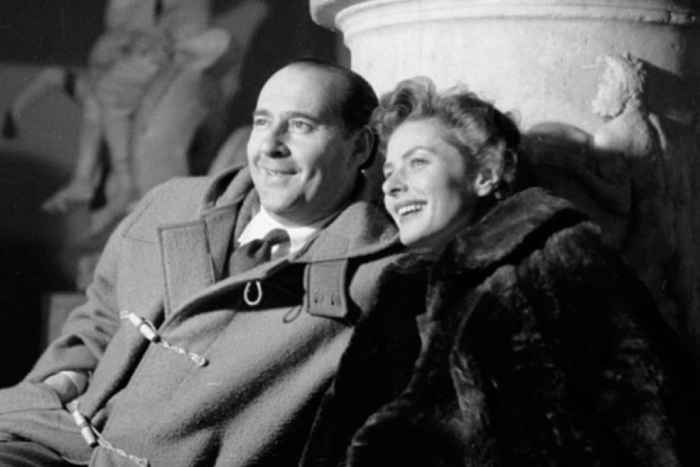
In 2011, Natalie Portman won the Oscar as Best Actress while pregnant out-of-wedlock. For the most part this caused no ripples, except some complaining from Mike Huckabee, the former Arkansas governor who was making a run at the Republican Party nomination for President in 2012 (he did not get it, that went to Mitt Romney). Huckabee criticized Portman on a radio show stating, “I think it gives a distorted image. It’s unfortunate that we glorify and glamorize the idea of out-of-wedlock children.” 6 There might be a difference between Senator Johnson criticizing Ingrid Bergman and Mike Huckabee criticizing Natalie Portman. In Johnson’s situation he seemed to be reflecting views and attitudes well beyond his own to a broader society at the time. In Huckabee’s situation it simply seemed like an attempt to exploit the moment (the Oscar’s and Natalie Portman) for the sake of some political brownie points among potential Republican Party primary and caucus voters heading into the 2012 campaign season.
In watching The Marvelous Mrs. Maisel what is missing is a sense of risk-taking that goes with boundary pushing. In one scene, after Mrs. Maisel is forced off the stage by a club owner for using the word pregnant, she wanders into a bar to get out of the rain and runs into Lenny Bruce drinking and drowning his sorrows. He recounts for her that he has a warrant out for his arrest from Chicago for jokes he said on stage, one involving the Pope, another involving Bob Hope and his legal bills have him bankrupt. Even watching this exchange does not evoke a sense that risk, retribution, banishment can go with pushing up against what might be considered established boundaries. Bruce is simply part of the witty dialogue that weaves itself through the series.
In one scene three African-American girls suddenly enter a soda shop all dressed the same, giving the impression they were a singing trio. The girls are warmly welcomed in this moment of remembering backward to when Joel Maisel proposed to Midge. If the series is taking place around 1958 and 1959, then this particular scene in the soda shop is probably some six or seven years before that. The few times an African-American appears in the series, everything is just fine. Contrast this with the movie Green Book (2018) where Don Shirley (played by Mahershala Ali) tours the South in the early 1960s as a prominent classical and jazz pianist and is confronted with racism at every turn. OK, the scenes in The Marvelous Mrs. Maisel are primarily in New York not the deep South. In 1950, however, Woody Guthrie (most well known for his song This Land is Your Land) moved into an apartment in Beach Haven (Brooklyn, part of New York City). His landlord was Fred Trump, Donald Trump’s father. In 1954, Guthrie wrote a song titled Old Man Trump, with some of the lyrics going, “Old Man Trump knows Just how much Racial Hate he stirred up.” 7 A 1963 article in the New York Times addressing African-Americans in New York City stated, “Segregation is as much a fact of life [in the North] as it is in the South. [A]lmost invariably the color of [the Negro’s] skin determines where he goes for school and how he makes his living.” 8
Nostalgia, that Wonderful Prism To Look Both Backward and Forward
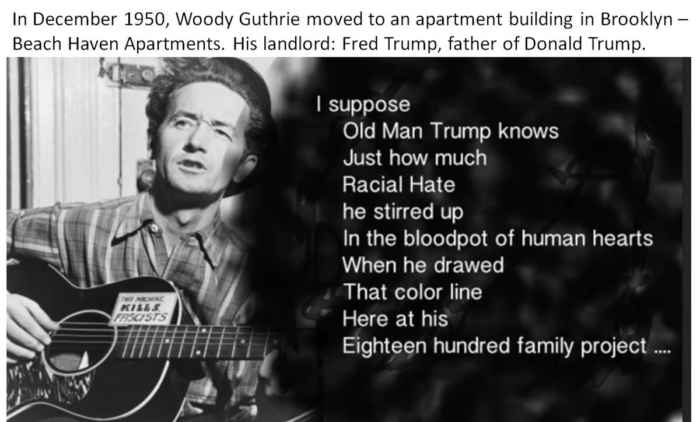
The Twilight Zone was a television series originally on the air between 1959 and 1964. In one episode, “A Stop at Willoughby,” Gart Williams (played by James Daly) is a 38-year old advertising executive who hates his life. Added to his problems associated with his job is his wife, Jane (played by Patricia Donahue) who lets him know in no uncertain terms that he, essentially, exists to give her money. While traveling on the commuter train home from work he falls asleep and awakes to find that he has gone back in time to July 1888 and the town he is looking at, Willoughby, is described as, a “peaceful, restful place, where a man can slow down to a walk and live his life full measure.” He, obviously, likes what he sees. This happens again and, once again, he is brought back into the present. He vows that if it happens again, he will get off the train and stay in Willoughby. Well, the event happens again and he steps off the train and is greeted and welcomed to his new home in the past. The scene shifts to the present where a conductor recounts how Williams stepped off the train while it was moving and died instantly, “Poor fellah,” says the conductor.
A number of Twilight Zone episodes addressed nostalgia, the longing for something in the past. In the case of Gart Williams, that longing for the past was prompted by an unpleasant present-time (job, wife). While in the case of Williams he got what he wanted, a number of psychological studies address the abnormal associated with longing for the past. In fact, the word “nostalgia” seems to begin in 1688 when a Swiss physician combined the Greek words for “return,” and “sorrow,” which roughly translated into English as “homesickness.” By the 18th Century, the word “nostalgia” became the preferred way to refer to someone who had an overwhelmingly need to return home. Oftentimes, depression and suicidal tendencies became associated with this condition.
Another Twilight Zone episode was titled “Walking Distance.” And, once again, a 36-year old advertising executive, Martin Sloan (played by Gig Young) finds himself longing for the past. In this case Sloan finds himself back in the town in which he grew up. After meeting himself as a youngster, he is determined to convince the younger him that he needs to enjoy his youth. By the end of the episode, you get the feeling that this is accomplished as he meets his father who convinces him to return to his own time. The closing narrative goes:
[Sloan was] successful in most things but not in the one effort that all men try at some time in their lives—trying to go home again. And also like all men perhaps there’ll be an occasion, maybe a summer night sometime, when he’ll look up from what he’s doing and listen to the distant music of a calliope, and hear the voices and the laughter of the people and the places of his past. And perhaps across his mind there’ll flit a little errant wish, that a man might not have to become old, never outgrow the parks and the merry-go-rounds of his youth.
In the case of Gart Williams, the past is one that is not connected to his past, his childhood, while Martin Sloan’s childhood is front and center. Nostalgia can be seen on two levels, through different, but both types of nostalgia filled these episodes. The longing for the past that never was and the longing for the past that was but needs to be tinkered with to make it better.
The Marvelous Mrs. Maisel tinkers with the past. The past that is the nostalgia of Gart Williams is present in Mrs. Maisel where we see something that looks like the 1950s, a New York life and a created past that we have no relationship with. At the same time there is the nostalgia of Martin Sloan where we see something that looks like it was us and somehow it has been lost and maybe there is a way back.
Svetlana Boym, a professor of Slavic and Comparative Literature at Harvard University makes a wonderful statement about nostalgia, “A contemporary Russian saying claims that the past has become much more unpredictable than the future. Nostalgia depends on this strange unpredictability.” Elsewhere she writes, “Nostalgia is not always about the past; it can be retrospective but also prospective.” 9 While the origins of the word can be traced to the study of psychological disorders, she manages to place the word in a different light, demonstrating that examining this word is more than just related to personal therapy. Nostalgia serves a function that can be seen in a variety of ways. In Boym’s case, she is examining the changes that took place after the collapse of the Soviet Union and all the changes that it brought to Russia, as well as Europe.
Getting away from some of the psychological overtones associated with using the word nostalgia, it is possible to just see it as related to how we think. When talk radio, usually political in tone, have callers who feel the need to vent about “kids today”, or “when I was young”, or “we need to return to”, or “when times were simpler”, they are expressing how they use nostalgia in some ways to think. Bill Cosby (despite what you may think of him now) had this classic routine on “Children are brain damaged” addressing “when I was young” on the need to walk great distances to school, usually uphill, both ways. His whole routine is about thinking. In a 1985 movie, The Breakfast Club, a group of high school students are doing detention after school and Carl the janitor (starring John Kapelos) is having a conversation with the school’s principal, Richard “Dick” Vernon (played by Paul Gleason) and Vernon is complaining about the usual theme of “kids today.” At one point Vernon tells Carl, “Someday these kids are gonna be running the country. This is the thought that wakes me up in the middle of the night.” Carl responds to Vernon’s complaints about the students by telling him, “The kids haven’t changed. You have.” A good exchange and an outgrowth of what Carl has learned from keeping track of students at the high school that spans time in detention over years. As Carl says, “following a broom around after shitheads like you for the past eight years I’ve learned a couple of things. . . I look through your letters. I look through your lockers. I listen to your conversations, you don’t know that, but I do. . . I am the eyes and ears of this institution my friends.”
Nostalgia raises issues about our connection to the past. We are an accumulation of our life’s development but it is sometimes difficult to see or understand the threads that tie us between where we began and where we are now. The two Twilight Zone episodes show two men trying to connect with a past, Bill Cosby’s routine and The Breakfast Club are more about a disconnect. Cosby’s routine is hilarious to listen to in its entirety and in an extreme sense almost has adults wondering how they got to be adults from a youth as portrayed by Cosby. The Breakfast Club shows a principal who is disconnected from his own childhood. It is interesting that at the beginning of the movie there is a brief scene in which Carl the janitor’s picture as a high school student is shown: Carl cleans the high school he attended as a student. The movie has a principle disconnected from his youth and a janitor who is connected to his every day.
Nostalgia as a connection backwards is not necessarily all that precise. Karl Sabbaugh, a writer and television producer, pointed out that a short poem he remembered that his mother frequently said to him was not quite the way he remembered it. Memory is faulty, but we sometimes treat it as though it were not and then use those memories to build upon other memories to create a past that can develop into a story or an ideology and then it becomes cast in stone and difficult to question and it affects our thinking in ways we will not necessarily question. 10
John Wayne talked about watching cowboy and Indian movies with the stage coach inevitably being chased by Indians shooting at the coach, the driver, the passengers, but never just shooting the horses to bring the coach to an immediate halt: Good movie making not necessarily anything close to reality. If we use some image of “The Old West” as developed from watching John Wayne shoot a few too many Indians or Randolph Scott, or a host of others, and our image of a past not real is more real to us than what was real and now insightful words by the Duke challenge what we had always assumed, well how will that affect how we use the past to understand the present and look to the future?
Lenny Bruce wrote that there were complaints that a public, well a part or segment of it, wanted to return to what they saw as some type of wholesome humor delivered by comics in the 1920s and 1930s (this, he wrote, in the early 1960s). Bruce then looked at Shelley Berman, probably best known for playing Larry David’s father in Curb Your Enthusiasm, but who had a career decades earlier as a stand-up comic (in his case he sat on a stool). In 1959 he won the first Grammy Award for a comedy album. Bruce said of Berman’s humor, “the healthy comic would never offend…unless you happen to be fat, bald, skinny, deaf, or blind.” 11 Milton Berle was known as “Uncle Miltie” or “Mister Television” in the 1950s. His cross-dressing was famous—and not in isolated comedy clubs but on television. As explained by one writer:
In 1948, Berle was television’s first superstar, often utilizing the reliable burlesque trope of putting a man in a woman’s dress on his weekly series, The Texaco Star Theater. Back then, adopting the implied but never explicit characteristics of gay or trans people was reflective of an aggressively hetero-dominant culture. 12
How humor was presented seemed to matter. Bruce could be seen as a threat to morals, too far out there, but Berman and Uncle Miltie, well, that was different; somehow it was the wrapping.
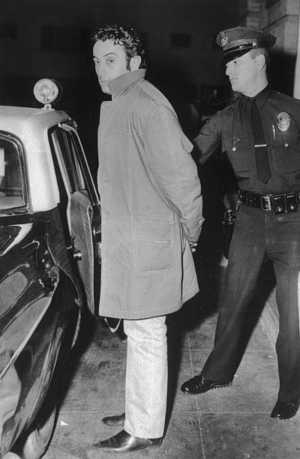
The Marvelous Mrs. Maisel is wonderful nostalgia. This is a rose-colored version of the past without any of the stains, which exist in any era. Whether those stains existed more in the 1950s than other eras is debatable but so much happened that picking and choosing what to highlight or even briefly glance at is normal when looking back and somehow using it to judge the present and look forward.
Jewish permeates the series but there is no hint of anti-Semitism. This is the late 1950s and not too many years earlier anti-Semitism was at a highpoint. In 1939 the German American Bund held a rally in Madison Square Garden with Swastika flags protesting “Jewish conspiracy in America.” During the Second World War years (1941-1945) the Christian Front, primarily Irish-Catholics terrorized Jewish communities in Boston and New York. One writer stated, “Young Irish-Catholic men inspired by the Christian Front desecrated nearly every synagogue in Washington Heights [Brooklyn]. The New York Catholic hierarchy, the mayor of Boston and the governor of Massachusetts largely looked the other way.” 13 In 1945, as concentration camps in Europe were being liberated at the end of the Second World War, Bess Myerson would go on to win the Miss America crown. As the first and only Jewish Miss America, antisemitism reared its ugly head. A pageant official asked her to change her name to sound “less Jewish.” 14 When she won the title, she was barred from a country club reception held in her honor because the country club did not admit Jews. Three of the five sponsors of the pageant would not use her in ads which referred to Miss America. 15 Progress for Jews was seen in an odd way in a quote from a 1956 article in the New York Times when it stated, “Discrimination against Jews in admission to colleges and universities was said today to be not as serious a problem as it once was.” 16
Jewish New York by Way of Gentile
Usually, in writing it is a good idea to approach writing in the third-person, but here the personal helps to emphasize a way of looking at how life in a certain time and place is remembered. Somewhere as I grew up in the 1950s I became aware of Jewish and Gentile. I am not Jewish. I was raised a Catholic boy in the Big Apple before it was known as the Big Apple (New York City). “Christian” was a word that meant non-Jewish but not Catholic. Catholics did not call themselves “Christians”—they were different. We were Catholic, they were Christian, over there was Jewish. The word “Christian” as used today is too closely associated with some sorts of conservative political thinking and might include Catholic. “Gentile” was a word that I remember hearing, perhaps it helped Catholics avoid feeling the need to be associated with Christians who were lumped together as a conglomerate of Baptists, Protestants, Lutherans, and anyone else who was not Jewish but not Catholic.
I began to hear of country clubs that were Jewish and others that were Gentile, and then I heard about the Catskills and the Borscht Belt. Race relations were an issue then as now and so were inter-faith relations. I remember my father telling me that when he put our home on the market to sell it, neighbors talked to him to emphasize they did not want him to show it to any black family. This in the early 1960s. My father was so mad that he asked several African-American men he worked with to bring their families to see the house, even though they had no intention of buying it, just to annoy the neighbors. Mom made everyone dinner and that was how we spent several Sunday afternoons one summer.
I remember my mother praying for Andrew Goodman, one of three Civil Rights activists murdered near Philadelphia, Mississippi during the Freedom Summer of 1964. Goodman was from the New York City area and my mother said she briefly met his mother somewhere and felt the need to do a novena in his memory. The movie Mississippi Burning (1988) is loosely based on these murders.
My thinking regarding race relations as well as inter-faith relations developed from how my parents saw these issues. To my parents, race relations needed to improve since, the way they saw it, anyone who was black was deliberately being kept from improving themselves and they deserved as much opportunity as anyone who was white. My father through his job knew Louie Armstrong and talked about frequently having lunch with him and attending his funeral. On the other hand, the way they looked at inter-faith relations was different. From their point of view Jewish and Gentile somehow came to an understanding to have something that looked like separate lives, hence separate country clubs (even though my parents were not well off enough to join one if they wanted to). In the case of the Catskills, there was the Borscht Belt for Jews which was separate from places in the Catskills where Gentiles stayed. I remember hearing that term “Borscht Belt” from probably before I could ride a bicycle.
The Catskills were inter-faith, but separated. We often spent summers at different places in that part of upstate New York. But, while driving on a road headed to wherever we were staying, my mother would inevitably point out a sign or entrance to a resort (not all were glamorous) which she felt the need to point out was “where you went if you are Jewish.” The somehow agreed separation of the faiths was alive and well and I could see it in the Catskills. The inter-faith interaction I remember well was my mother arguing in Yiddish with rabbis at Jewish bazaars where Catholics (and Christians) bought their Christmas presents. My mother said she learned Yiddish growing up on the Lower East Side in New York City. Robert Samuelson, a columnist for the Washington Post wrote about growing up in the suburbs around New York City in the 1950s, so somewhere near where I grew up and expressed a point of view that I could understand:
[W]hen I was growing up in the 1950s in a suburb of New York City, I had no sense of anti-Semitism. By that, I do not mean that I looked around and found little evidence of anti-Jewish feeling. I mean that I had no concept of anti-Semitism. To me, it didn’t exist. I had as much knowledge of it as I did of, say, quantum physics. Nothing at all. There were very few other Jews in my public elementary school, and I did not feel different from the students, with Christmas as a minor exception. The singing of those Christmas carols made me uncomfortable. But there was no wrenching identity crisis. I mouthed some of the songs that seemed religious and sung those that didn’t. My family straddled the divide between the secular holiday and the religious. We had a Christmas tree and presents; but we also celebrated Hanukkah. More presents! 17
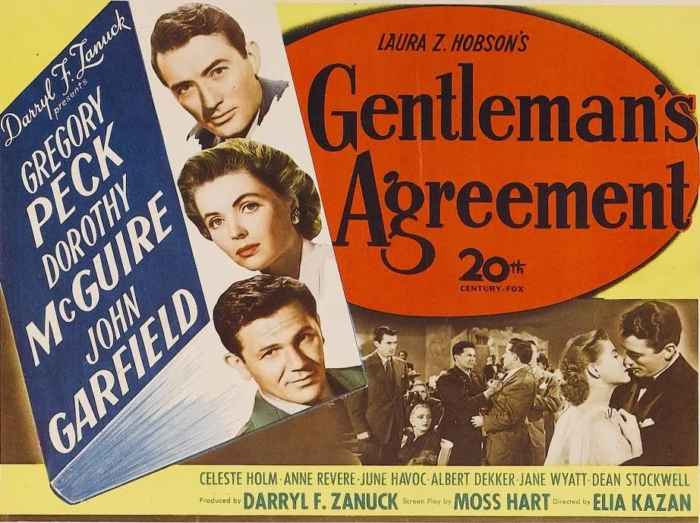
Gentleman’s Agreement (1947) starred Gregory Peck who played journalist Phil Green who moves to New York City with an assignment to write about anti-Semitism. He pretends to be Jewish in order to experience first-hand bigotry and hatred. I remember seeing the movie somewhere during the early 1960s on television and it forced me to start to see inter-faith relations in ways different from several years earlier. But one movie does not force a sudden change, it just contributes to a process of a change of attitude.
Borscht Belt: A Place and a State of Mind
In The Marvelous Mrs. Maisel, parts of the second season take place at a resort in the Catskills. The term Borscht Belt is not used, but a viewer can get a sense that Jewish culture is alive and well. Phil Brown, who heads the Catskills Institute, said of the Borscht Belt, “It was not just a summer place, but a capsule of many parts of Jewish culture.” 18 Borscht refers to a soup from Eastern Europe; beetroot is the main ingredient and is served hot or cold.
Lenny Bruce, who weaves through the first two seasons of the show, in fact did stand-up comedy as well as conducted dance lessons at Kramers on Luzon Lake during the summers of 1950 and 1951. In the scene when Mrs. Maisel is quickly ushered off stage for using the word pregnant, while the club owner is offended, there is no sense the audience is offended, in fact they seem to embrace her. Bruce had something of a similar situation happen at Kramers. As the son of resort owner remembers it:
[T]here was a particularly large, raucous crowd at Lenny’s show. A couple of guests knocked on my father’s door to demand that he quiet down the crowd. Reluctantly, my father ventured downstairs. When he arrived at the casino, there was a pudgy, pimply-faced kid on stage talking dirty in New York English and broken Yiddish. The crowd loved it, but this was too much for my father. He marched on stage in his bathrobe, slippers, and cigar and kicked the young comic off the stage. 19
At, perhaps what might be considered a highpoint year, 1953 in Sullivan County, located in the heart of the Catskills, the county had 538 hotels, 1,000 boarding houses and 50,000 bungalows. One writer remembering the Borscht Belt era said, “With a vibrant Jewish culture, a relaxed atmosphere and a celebrity clientele, the region offered a place for upwardly mobile American Jewish immigrants to be just that: American and Jewish.” 20 It is easy today to find pictures of a bygone era. Online are numerous pictures of well known resorts, such as Grossinger’s and the Concord, which now look like western ghost towns. 21
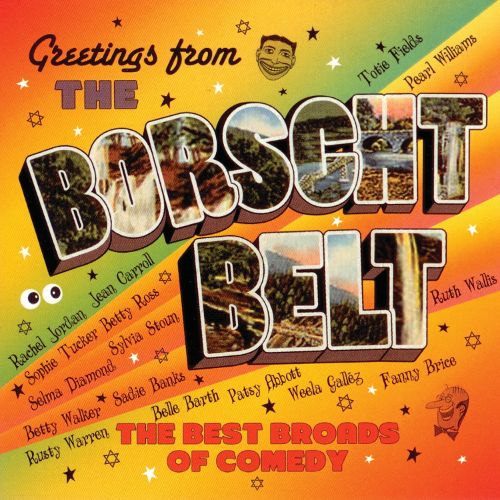
The Marvelous Mrs. Maisel is not the only production to reawaken memories and images of the Borscht Belt. Dirty Dancing (1987) with Patrick Swayze and Jennifer Gray takes place in a fictional Borscht Belt resort. The movie is based on the memories of screenwriter Eleanor Bergstein who spent summers in the Catskills. Ironically, the movie was not shot in the Catskills since no suitable location could be found, resorts in North Carolina and Virginia were used.
The almost total destruction, or rather abandonment, of this era contributes to it living in memory. Remembering that Wilt Chamberlain worked at a resort and played basketball for the summer guests, or that Joan Rivers, Rodney Dangerfield, Jerry Lewis, perfected their material throughout the region, or that Eddie Fisher (father of Princess Leia, OK Carrie Fisher) worked at a resort only to return later as a star, add to memories, and to nostalgia.
Marian Maisel embraces her time at the resort where her family have a bungalow. The enthusiasm she shows helps to contribute to the nostalgia. While staying in the Catskills, her manager (played by Alex Borstein) arranges a stand-up comedy date at a local hotel for their “blue night.” In her stand-up Mrs. Maisel includes some reference to male body parts and the audience loves it. Comedy could be separated into clean and slightly off-color. The manager wants her back; this is an interesting contrast with her being shuffled off stage because she used the word pregnant at a club in New York City. Taking these two scenes together adds to seeing the Catskills as a world apart. Nostalgia can be powerful when it is seen in isolation, separated from other parts of a time or era.
The demise of the Borscht Belt seemed to come quickly. Reasons for the decline are attributed to Jewish assimilation into American society, or cheap air travel which allowed for flights to Europe, or to a general attitude change that vacation time could simply be spent at many other locations. Nostalgia is what is left. Joey Adams, a comedian, radio host, gossip columnist wrote of this era, “The Borscht Belt is Dead/Long Live the Borscht Belt!” 22 Michael Fein who was a Borscht Belt singer said, “This was a special area that had a profound impact, not just on Jews but on American culture.” A casino that was being built on the site of the Concord had plans to recognize Catskill’s past, as a spokesperson said, “[W]e’d love to [have] a little museum. You can send your memorabilia to this little museum, and we’ll preserve it.” Fein’s response was, “I can’t believe this is how it ends…in a little shop that sells trinkets.” 23
The Power of Nostalgia as Seen on the Screen
It does not matter what it is called, change, progress, growth from destruction, but life around us does not stand still. We age and start to remember something from an earlier era, it could be when we were growing from child to adult or reaching farther back to a time we did not know but seem like we should have a connection to. One writer stated, “Nostalgia is a bittersweet yearning for the past. It’s sweet because it allows us to momentarily relive good times; it’s bitter because we recognize that those times can never return. Longing for our own past is referred to as personal nostalgia, and preferring a distant era is termed historical nostalgia.” 24
What is fascinating about The Marvelous Mrs. Maisel is that it reaches back just far enough to an era where viewers can feel some connections. It looks somewhat modern yet just a step removed. It will be interesting to see if the outfits that Marian Maisel wears will lead to some revival in a clothing line. In one scene, Marian and her mother (played by Marin Hinkle, who was good in Two and Half Men but better in her current role) walk into a bedroom where there are racks of clothes—more than seems normal for anyone’s wardrobe. The constant change of outfits does not go unnoticed, the clothes are meant to express an attitude. As Donna Zakowska, the show’s costume designer stated:
Midge’s look for me was an attempt to optimistically capture the spirit of a woman, who in spite of unfortunate events continues to assert her spirit to remain on her feet. Her love of clothes, detail and color would become tools for expressing her strength and identity. 25
The clothes are just one element, which would not be possible if the setting were, for example, the 1920s or 1930s, too far removed to feel a sense of connection.
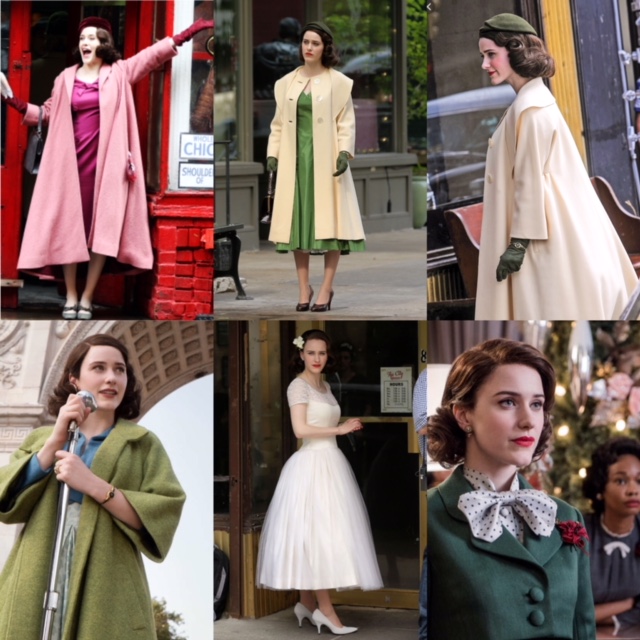
Abe Weissman (starring Tony Shalhoub, who was good in Wings, better in Monk, and equal to his Monk role here), goes to work for Bell Labs, while still teaching mathematics at Columbia University. Bell Labs began in 1925 and by the 1950s carried a certain mystique that inventions coming out of it would create a brighter future. Bell Labs was not associated with DuPont but DuPont had an advertising slogan that expressed an outlook on the future, which fits with the way Bell Labs was seen, “Better Things for Better Living…Through Chemistry.” The laser and aspects of computer network design came out of Bell Labs. Between Marian’s clothes and Abe’s work with Bell Labs, a better, brighter tomorrow is an outlook the show has developed.
As season two comes to an end, Abe’s future with Bell Labs is in doubt but that might be separate from a feeling that the future holds wondrous new inventions that can benefit people. The Marvelous Mrs. Maisel does not create a feeling of impending doom but a future to look forward to. There are some cliffhanger issues at the end of season two but so much of the appeal of the show is based on positive feelings that one gets the impression any adversity will be overcome. As one writer states, “Nostalgia is an emotion…it can involve positive feelings such as fondness.” 26 Another writer who explored the term wrote “Nostalgia is…created in the present and…can be viewed as a commentary on life in the present.” 27 The past is remade not understood as it was. One writer, highly critical of the show, wrote, “Mrs. Maisel takes place in a supersaturated fantasy 1958 New York.” 28
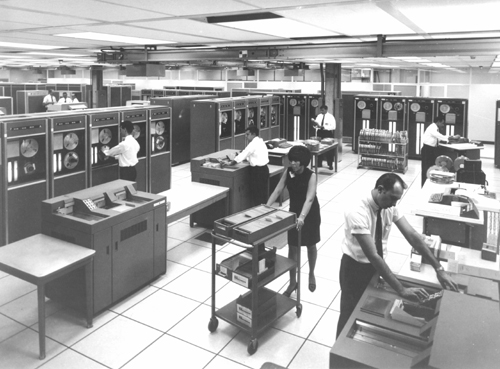
Is there anything wrong with enjoying the show? The danger of creating an image of the past that is used to provide some justification for a political position in the present has to be avoided. Bill O’Reilly, former Fox News personality or political commentator, got into an odd spat with Michelle Obama, while she was First-Lady. O’Reilly said regarding the building of the White House, “Slaves that worked there were well fed and had decent lodgings provided by the government.” 29 This type of nonsensical thinking can be harmful. Obama had said, “ I wake up every morning in a house that was built by slaves.” That was enough for O’Reilly to feel obligated to sound off, apparently feeling the need to defend something, what is not clear. Why he felt the need to respond is a mystery except that he always had a full head of steam and pontificating on anything was acceptable to him. O’Reilly’s need to whitewash a past seemed to have less to do with making some historically accurate statement and more to do with how he wanted the present understood. The statement above by a writer , “Nostalgia is… a commentary on life in the present” fits what O’Reilly tried to do.
Almost equally as odd as O’Reilly demonstrating an incredible callousness is Steve Doocy of Fox & Friends who felt the need to refer to Downton Abbey as a way, apparently, to address current health care issues, a strange use of fantasy nostalgia. He stated, “The entire town loves the rich guy who lives in the Abbey. Because he provides the jobs, he looks out for everybody, he has free medical care for everybody and without him…the place would go belly up.” 30 Take a wonderful fictional series and use it in ways the writers probably never considered. Nostalgia is fine if it makes one feel better, so be it. Most people will understand how to look through rose-colored glasses and see Walt Disney’s Main Street with all its trappings but they know reality is outside beyond the parking lot. Whether O’Reilly or Doocy believed what they were saying, their aim seemed to be that of somehow influencing, or manipulating people, to see things a certain way; while O’Reilly was just appalling, Doocy was out of touch with reality.
The Marvelous Mrs. Maisel is a wonderful series. The writing is sharp, the actors as an ensemble are enjoyable to watch. While the focus may be on the lead character, without the constant interplay between and among the other cast members, Mrs. Maisel would be nothing. Nostalgia comes with the show and nostalgia is imperfect which is why it, by itself, it not a way to connect to a past or look at life around us.
Works Cited
- https://www.nytimes.com/2003/12/24/nyregion/no-joke-37-years-after-death-lenny-bruce-receives-pardon.html ↩
- ibid. ↩
- https://www.rollingstone.com/culture/culture-lists/50-best-stand-up-comics-of-all-time-126359/robin-williams-6-191726/ ↩
- https://www.thedailybeast.com/when-congress-slut-shamed-ingrid-bergman ↩
- Ibid. ↩
- https://thecaucus.blogs.nytimes.com/2011/03/04/huckabee-slams-natalie-portman-for-out-of-wedlock-pregnancy/ ↩
- https://woodyguthrie.org/Lyrics/Old_Man_Trump.htm, and, https://www.newyorker.com/culture/cultural-comment/a-story-about-fred-trump-and-woody-guthrie-for-the-midterm-elections. I have seen other lyrics that go, “Beach Haven is Trump’s Tower where No black folks come to roam. I used lyrics from a recording that can be found online. Here: https://www.bing.com/videos/search?q=lyrics+to+old+man+trump&view=detail&mid=EF0B1D1C6081CC535488EF)B1D1E60 ↩
- https://www.huffingtonpost.com/chin-jou/the-jim-crow-north-new-york-civil-rights_b_5613150.html ↩
- https://bit.ly/2BGRFLn ↩
- Karl Sabbaugh, Remembering Our Childhood: How Memory Betrays Us, New York, Oxford University Press, 2009 ↩
- https://www.laphamsquarterly.org/comedy/lenny-bruce-loses-crowd ↩
- https://www.pastemagazine.com/articles/2017/12/cross-dressing-at-the-crossroads-a-brief-history-o.html ↩
- https://www.nytimes.com/2017/04/11/magazine/i-thought-i-understood-the-american-right-trump-proved-me-wrong.html ↩
- Kevin Eckstrom, “Bess Myerson on being the first (and only) Jewish Miss America,” Washington Post, January 6, 2015 ↩
- Pamela S. Nadell, “On their own terms: America’s Jewish Women, 1954-2004,” American Jewish History, September/December 2003 ↩
- “College Bias Held Less,” New York Times, May 30, 1956, p. 22 ↩
- https://www.twincities.com/2018/10/31/robert-samuelson-the-future-of-anti-semitism/ ↩
- http://www.hvmag.com/Hudson-Valley-Magazine/August-2014/History-of-Borscht-Belt-Hotels-and-Bungalow-Colonies-in-the-Catskills/ ↩
- Ibid. ↩
- https://forward.com/culture/183901/rediscovering-beauty-amid-ruins-of-once-glorious-c/?p=all&p=all ↩
- https://www.thedailybeast.com/the-ghost-hotels-of-the-catskills ↩
- https://forward.com/opinion/159358/the-borscht-belt-is-dead-long-live-the-borscht-bel/ ↩
- https://www.brown.edu/Research/Catskills_Institute/confReports/confrep_6lat.shtml ↩
- http://theconversation.com/the-psychological-benefits-and-trappings-of-nostalgia-77766 ↩
- https://www.kveller.com/mrs-maisels-11-best-outfits-and-how-to-copy-them/ ↩
- https://medium.com/@christinelariviere/nostalgia-in-the-age-of-social-media-identity-meaning-connection-da9f31d2c413 ↩
- Janelle Wilson, Nostalgia: Sanctuary of Meaning, Lewisburg, PA, Burknell University Press, 2005 ↩
- https://www.heyalma.com/sorry-but-the-marvelous-mrs-maisel-has-a-history-problem/ ↩
- https://www.politico.com/story/2016/07/bill-oreilly-slaves-white-house-226257 ↩
- https://jezebel.com/5977949/downton-abbey-has-been-secretly-turning-you-into-a-right-winger-this-whole-time ↩
What do you think? Leave a comment.











I was an extra in season 2 / episode 9. A joy to be part of this great series.
That must have been enjoyable–I see an article in the making. That is something I would like to do.
All this nostalgia for 1950s America. Where are the shows that bring to life that decade for the UK?
84 Charing Cross Road (1987) starring Anne Bancroft and Anthony Hopkins. To some extent this movie addresses some aspects of the 1950s in the UK. Just an excellent movie. The time period is broader than the 1950s but it’s in there. I think that’s my only reference to anything on the UK in the 1950s, outside of some readings on political issues associated with espionage.
Season One of The Crown took place in the 1950’s UK. A few years ago there was The Hour on the BBC.
An excellent series The Crown. At points in different episodes I found myself searching the Internet for how close to real certain issues raised were presented.
Well apart from Suez what happened in the UK in the 50’s that’s worth watching?
I have noticed the recent “demonization” of the 1950s in series such as “Grantchester”. I think it’s just lazy “baby boomer” writers, children of the 1960s and 70s having a pop at their parents. They’re not looking at it objectively, instead they’re just inventing a whole mythology. So sad that many of these writers have not grown up and are still thinking like rebellious teenagers.
I’ve seen the 1950s presented in a variety of ways, not just one happy feel-good moment in time. I suspect that in the case of the 1960s and 1970s, there appear to be much more political overtones that affect how those decades are presented. Notice in the case of The Marvelous Mrs. Maisel, there is some reference to government security clearance with Midge’s father working at Bell Labs, but not much else. As the show goes along, I wonder if politics will enter the series. There was some discussion Midge had in one episode where Dwight Eisenhower’s wife, Mamie, was discussed but not in any political way.
Thanks for the article. What made women become so suppressed, did they know and didn’t care or was it because of their social status that they couldn’t? Also,why did people subject/conform to these social norms?
A friend who taught in an education department at a university where I taught years ago, use to talk about women in the 1950’s and she stressed the point that it was white middle class women who did not work, not so if you were poor and white or African-American. Certainly what stands out with The Marvelous Mrs. Maisel is the financial security Midge enjoys. As a professor I marvel at the luxury her family enjoys with her father a math professor at Columbia University. Somewhere in the second season it is brought up that the university owns the apartment they live in. I wondered whether the maid was also covered by the university.
Women just weren’t considered equal to men, they were lower than men, and since they weren’t equal, they couldn’t do anything about it. Because that had always been how things were, no one protested against it, because there was nothing to protest. That was just regular life. That happens in eastern countries too, especially China, where boys are way more valuable than girls.
This probably applied to middle class white women. If you were a poor women or African-American, you worked. It is always interesting to read an analysis of women entering the workforce, usually associated with the 1970s, and no acknowledgement that many women were already in the workforce. An interesting book on women who trained to be astronauts and that it went nowhere: The Mercury 13: The True Story of Thirteen Women and the Dream of Space Flight – Martha Ackmann. These women trained in secret and then were just dismissed.
In the 1950s there was a spirit of a shared culture in which most of our people have never had it so good. But today’s protected minorities had it much worse.
There may have been more of a culture of not allowing a greater degree of free expression so conformity looked like the norm. What emerged as strains quite clearly in American society in the 1960’s, had to come from somewhere and they were there, just not so visibly apparent during the 1950’s.
I liked your article on a topic that is not always given attention. The Breakfast Club is such an iconic movie as well. Perhaps a title that were not as specific would have been good, because I went ahead and read the article expecting to read about Mrs. Maisel and Lenny Bruce only, yet you also mentioned other good classics. Overall, nicely done!
I had thought of a broader title, but as I started writing this article, I ended but saving various issues to address in a broader essay on nostalgia, addressing it through a variety of movies, TV shows, and even political talk on cable news shows. As a Political Scientist, I see nostalgia as related to how we think politically and also to how we discuss policy issues. By using The Marvelous Mrs. Maisel as a reference point, I could weave some issues around the series and still come back to discuss the show. For me, the show served as an anchor to discuss nostalgia. The section where I remember my parents and some things about them, just hit me as I was watching some of the episodes, so I could weave that into some aspects of the show.
What’s the similarities and differences socially and culturally in the 50s and the 80s?
I’m not sure I can address this in any short way. Every era tend for characterized in somewhat simplistic ways, and going deeper reveals a great deal more complexity. Various factors, such technological change, medical advances, political issues, racial and ethnic relations, family structure, prevailing social norms, can contribute to differences between different eras, or in this case decades.
I’d have to say that cultural conservatism was probably the most prominent similarity between the two eras. Another similarity was that the ’50’s and ’80’s were relatively peaceful on the homefront in comparison to the raucous ’20’s, ’60’s, and ’70’s. The economy was quite strong in both eras, though it did become unsettled in 1987.
In terms of foreign policy, both eras were quite similar—both Truman, Eisenhower, Reagan, and Bush focused on combating and containing Soviet communism. One key difference, though, was that Reagan’s administration abandoned the containment policy of the past in favor of a strategy hoping to bankrupt the Soviets.
As for cultural differences, I’d have to say that “conservatism”, though clearly present in the 1950’s, was much less pronounced. (It was neither “cool” nor strange; it merely was the omnipresent way of thinking.) After the ’70’s had roared by, “conservatism” revived, especially amongst young people. The difference, though, between the two eras (’50’s and ’80’s) was that conservatism in the ’80’s was no longer supremely held by most of the population. While it was quite popular (as “liberalism” was after 2008), other political and social beliefs existed and were quite prominent. Differences abounded and partisanship began to emerge.
Conservative might not necessarily be conservative–seeing the term in different eras, that is. In the 1950s, an expression “progressive conservative” could be used to describe the Eisenhower presidency. A gender gap in voting did not exist, where, as the 1980s developed, it was clear more women were voting Democrat than Republican-why Geraldine Ferraro was on the Democratic ticket in the 1984 Presidential election. A God gap did not exist in the 1950s, where, as the 1980s progressed, those voters who classified themselves as heavily Christian were voting Republican, those less inclined to attend church, voted Democrat. Political changes could be seen in social divides in the 1980s which were not there in the 1950s.
One of the attitudes that are most challenged today regard the 50’s as an ideal time because there was less divorce, premartial sex, why most women should stay at home and take care of the “man”…
Some of the data does point to an increase in divorce rates after the 1950s and then seemed to come down a bit, but not back to the levels of the 1950s. I’m not sure we can accurately measure premarital sex.
I am from the England and as I remember the fifties there were a great many men and women with their world view stretched by their wartime lives and looking to build a New England that matched their wish for a better world. Thatcher did not fit the fifties, it was better than that.
I remember it too. Fifties south London was racially intolerant, incredibly narrow minded and just plain mean to unmarried mothers, homosexuals and anyone who failed to conform.
I doubt I can comment on anything about 1950s London.
I was there in the 50s. There was more freedom of speech but a lot less tolerance for difference.
I remember Captain Video and that I was very jealous I could not be a member of the Peanut Gallery on Howdy Doody. Of course I should have been buying boxes of Topps baseball cards and storing them away to retire in high fashion today.
I imagine that probably sums it up pretty well.
I was there too.
Yes, there was petty intolerance, but people were accustomed to speaking freely, and not over reacting when things were said to them, or about them they didn’t like, not just racial remarks, but inter class ones too, and there were plenty of those!
The difference was that Witch hunting wasn’t the major way that Political Parties and newspapers tried to sell themselves.
Saw the pilot of TMMM a couple of years ago and really enjoyed it, hadn’t realised the show had continued. Excellent, that’s my evening’s viewing sorted out.
Hopefully, my article raised your interest in wanting to see the first two seasons.
Loved the pilot and clicked on Amazon last night to see the series waiting for me. Watched 2 episodes (30 min break for Detectorists – only 2 episodes left) and will binge watch more at the weekend.
Enjoy.
The pilot episode was very original and funny, beautifully shot, art direction a killer, played by an accomplished and engaging cast. Watched episode 2 last night and God it was flat. Where did the humour go? Why is she so annoying? Even when she got onstage again she wasn’t funny. Does it improve?
On reflection it just tries too hard after the first episode…
I don’t think the show would be as good as it is, if the comedy on stage were really good–it might overshadow the dialogue.
This show is brilliant. A whole season still to watch, life is good, well apart from Brexit & Trump. I would pay the Amazon subscription for this on its own, it’s that good.
Watching the show makes one realize how good television writing can be.
Just finished season two. Better than season one, in many ways. It’s clearly had a bigger budget, as it’s now channelling Mad Men for set design and feel. Some of the camera shots are wonderful. Why Amazon arent showing this is UHD is beyond me.
I still find a couple of things jarring. Firstly the ubiquity of the Zippo lighter. People didn’t use them as much back then. They all smoked, and used elegant lighters like Ronsons, Auar and duPonts. The fact that Zippo now pretty much owns all the other brands may have something to do with this.
Secondly Swearing. People didn’t curse, hardly at all. The whole goshdarn/consarnit instead of ‘God Damm’ it should tell you all you need to know. Not even in ‘blue’ nightclubs.
Why do you suppose there wasn’t much swearing in Mad Men? Notwithstanding it was basic cable.. but Weiner who got everything right, even down to the rhythm of speech, was correct about that to.
Eugene Sledge who would have been in his thirties in the 50’s wrote a book about the Pacific War, that finished just 10/15 years before Mrs Maisel is set – Possibly the best book about the Pacific war. In it he describes the horrors of the campaigns on the Pacific Islands , somewhere you’d think the rules would have been relaxed a little..
But nope he was as anti-cursing even whilst under fire, as the rest of the USA.
Thirdly the use of the word Stand-Up Lenny Bruce may have been one of the first Stand Ups, but he didn’t call himself a stand up, it wasn’t in common usage till the late 60’s.
I don’t agree about the swearing. Yes, even on stage in blue clubs swearing was rare (because the cops would pull you off… Oo-er missus). But off stage west and east coast comedians were as potty mouthed as jazz musicians. (In a few years, Frank Zappa will literally call his band “The Mothers”).
The point is, Maisels lack of filter means the back stage only language is filtering into her on stage material and personal life – shocking even fellow, more self controlled comics.
Yes the US armed forces were fairly straight laced compared to say, British Tommies, but that’s because they are mostly god fearing boys from the Midwest. Not NJ.
I have no clue regarding swearing. It would be interesting to see it addressed in an article.
Funny, I don’t remember zippo lighter. Now I have to go back and look.
I’m wondering if some of this can be documented in some meaningful ways: Swearing then and swearing now.
Excellent! I’ll binge-watch it at the weekend.
Glad I could inspire you to watch the show.
Tony Shalhoub is excellent as Mrs Maisel’s father and the soundtrack is fantastic. Well worth a binge…
I enjoyed Tony Shalhoub in here, but also in Monk.
Was the male breadwinner idea in a marriage beneficial to women in the 1950’s?
As I pointed in several other comments, only to middle class women and those that were comfortably middle class.
This middle to upper-middle class model was among its most accessible points in 1950s America.
Yes, very! Women were mainly “happy housewives” and would dress according to her husband’s wealth–it was shown by the way she would dress.
As I pointed out in a few replies, I suspect there was middle class (white) and that was different from poor or African-American. There were TV shows in the 1950’s, “The Donna Reed Show,” and “Ozzie and Harriet,” which portrayed the woman home as mother and wife–and homemaker (I don’t remember husbands making dinner or washing clothes.
50s was terrible for women. Was it a law in that time period that all woman couldn’t have a job or was it just white woman?
By the mid 20th century, there were few laws formally on the books that directly discriminated against women. The challenge that women faced was more at a social level. Businesses were not interested in hiring women for career positions. Lower class women worked as maids. Middle-class women worked as teachers or secretaries for a few years after school until they got married, had kids and their husbands managed to got started on their own careers. Then these women stayed home to raise the kids.
The 1950s could look terrible for some women but not all and the same can probably be said for the present. Imagine going ahead forty years and wondering how women then will look at our time.
No, women could work. There is a movie (I’m looking to find it, if I find I’ll post it) but in the movie, the husband’s finances suddenly go south and the wife says she’s work. Well, she’s in a department store working and friends as customers suddenly bump into her. The scene shows an awkward situation, where her friends have trouble accepting her working. They were not wealthy before her husband’s finances became a problem, but now it was imperative that she also work. This was made, I suspect, in the late 1950s or 1960s, so it reflected an attitude of the time.
Nostalgia trip for the 1950s… where no one wants to go! But thanks for the article though, shared with friends and family.
Glad you enjoyed reading it. Now you can binge on the show.
Goodness, another series of this to watch at the darkest gloomiest wettest time of year. Having just finished S3 of the Man in the High Castle, I will turn to this with glee.
Enjoy the show. Good to binge on.
Great piece. Really enjoy the show and most of the characters except for the whiny dad.
Thanks for enjoying my article.
Watched the first episode of season 2 last night – it’s as lovely and funny as ever. Everyone in it is excellent.
I agree. I think that it’s all the characters interacting, not just one, that makes it a good show.
What would widowed women do in the 1950s?
i believe they would continue with their lives and take on the responsibility of being a single mother and working one that is tough to do but can be done. the widowed woman may get remarried as do some in time.
Sounds like a question leading to an essay.
To add to my short comment: Perhaps someone should think of an essay that addresses how movies in different eras approached widows.
Just to add, I proposed a title on this in the Topics. It could be interesting to read as addressed through different movies in different decades.
Good question, I’m not sure.
Enjoyed reading this one!! Keep up
Thank you. This theme Nostalgia, which In think addresses a lot of the ways we think, I want to return to in other essays. We create images of a past and it effects how we see and evaluate the present.
If the actress playing Mrs. M’s manager doesn’t get every award going, there’s no justice.
Alex Borstein as Susie Myerson is quite good. I wondered if her last name in the show “Myerson” was somehow a tribute to Bess Myerson who I discuss in my article was the first and only Jewish Miss America.
I loved this show so much I binge watched the whole thing in two sittings. Rachel Brosnahan is fascinating. It’s like watching an old movie but with swearing.
An old movie–a good perspective.
Just binged TMMM and enjoyed it a lot, but with a few reservations.
I think that’s normal with anything we watch–we can watch with a critical eye. We see a TV show, a movie, a play and we want to tinker with it a bit. Nothing wrong with that. It is probably one of the ways we interact with what we are watching.
Oh.. that is nostalgia for 50s
Enjoyable nostalgia, which, as I point out, is fine. What needs to be pointed out are the words “with caution” in the article’s title. Enjoying many things that touch on nostalgia are OK, but we also remember that “reality is out there beyond the parking lot” (words from the article). Enjoy the show.
I binged it in the first few days but I remember from the first series, the dialogue is so dense, it is a show that can easily take rewatching. You can catch all the gags you missed first time round!
True, on the dialogue, that makes it an excellent show.
The nightclub scene is as clever as it is brilliant.
I agree.
It’s amazing. I can’t think of a series I’ve enjoyed more for years. Fantastic scripts, great performances, so, so funny.
I hope my article helped you to enjoy it even more.
I bloody love this show. Best thing in ages.
I agree, a very good, well-written, well-acted, show.
Enjoy the show. Good to binge on
Hope my article increased your enjoyment.
The Marvelous Mrs. Maisel leaves me feeling nostalgic for a time 40 years before my birth, which is nuts.
No. I think it’s OK to feel that way. I hope you enjoyed the essay.
the marvellous mrs maisel is a masterpiece
I have enjoyed the series and hope it’s run is long. Thanks for reading my article.